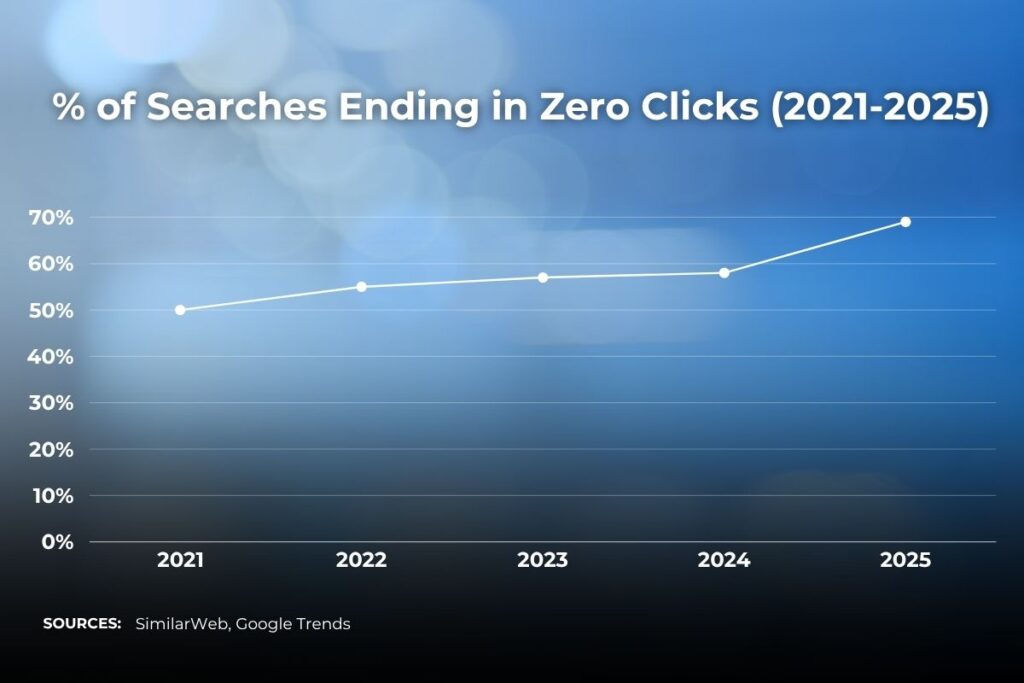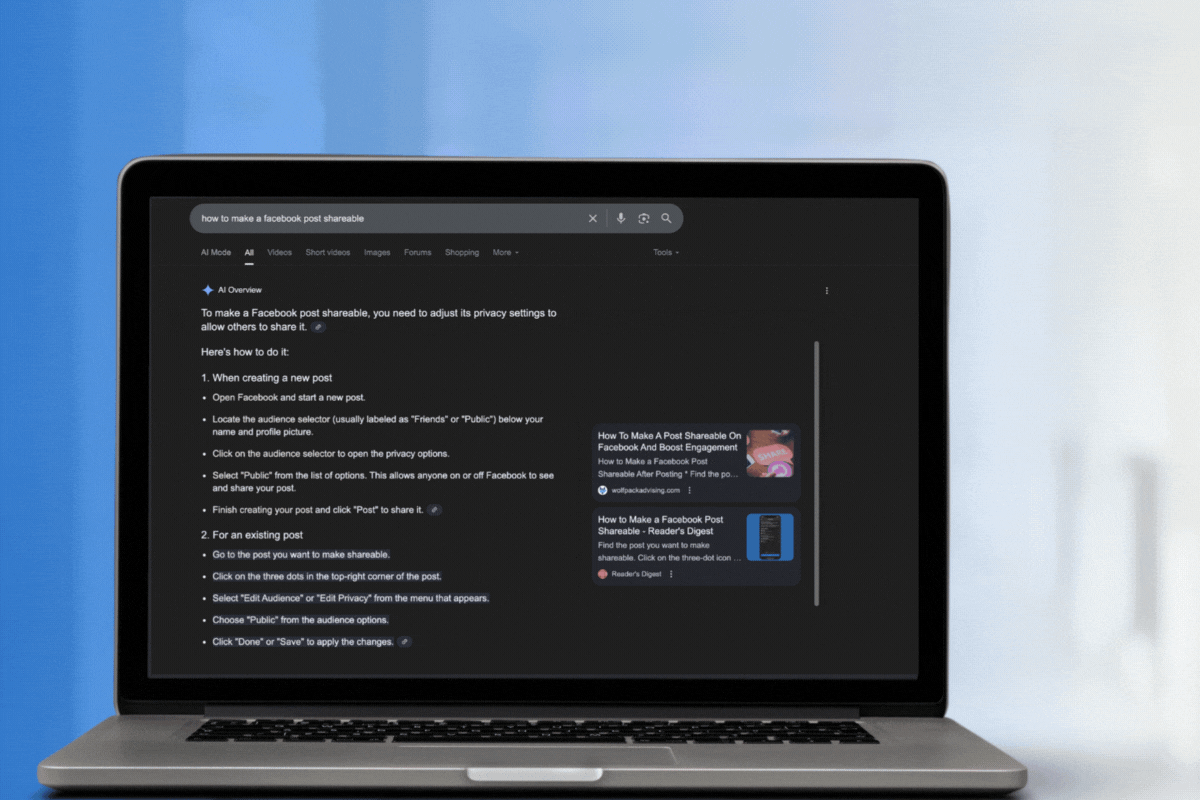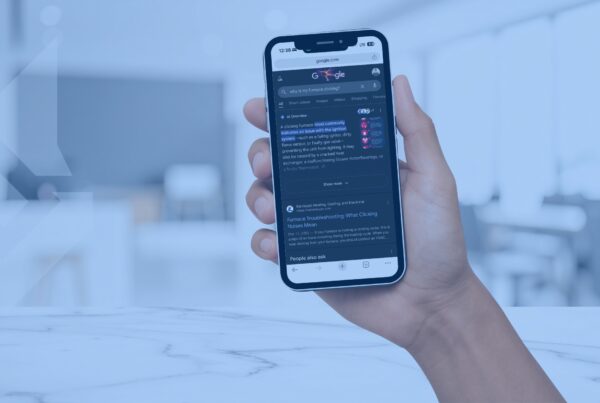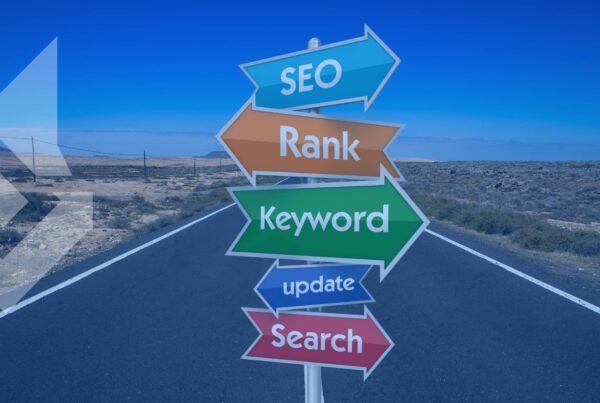Last updated on December 12th, 2025 at 03:44 pm
Since the U.S. launch of Google’s AI Overviews in May 2024, the share of searches that result in no clicks to a website has jumped from 56% to nearly 69%…Your strategy needs to take that zero-click marketing leap, too.
With Google AI Overviews, Perplexity’s web browser, and OpenAI’s growing browsing tools, users are getting their answers instantly and directly from the search results.
So, how can your business stay visible when clicks are no longer guaranteed? Let’s start with what zero-click marketing is, why it matters, and how to adapt your content strategy.
Contents
Why Zero-Click Search Matters
Zero-click marketing will represent both a challenge and an opportunity. According to recent studies, almost 7 out of 10 searches now end without a website visit.
On top of that, nearly 30% of all clicks go to a Google-owned property (like Maps or YouTube). Google and other platforms aim to keep users engaged within their ecosystems.
If your content doesn’t adapt, you risk invisibility, even if your rankings are strong, because it’s positioned below AI overviews and similar content.
But if your content is optimized to appear in featured snippets, AI summaries, and similar formats, you capture attention, build authority, and indirectly drive conversions.

Pros and Cons of Zero-Click Visibility
| Benefits | Drawbacks |
| Boosts brand visibility and authority | Reduces direct website traffic |
| Improves presence in AI and mobile-first SERPs | Can be harder to measure attribution and ROI |
| Aligns with future of search and user behavior | Risk of content being misinterpreted by AI |
What Content Lends Itself to Zero-Click Strategy?
Zero-click content delivers answers straight on a search engine results page (SERP), without requiring a user to click through to a website. These SERP features are designed for speed and convenience.
Examples:
- Featured Snippets: Quick summaries that answer specific questions at the top of results
- Google AI Overviews: Broader insights compiled from multiple trusted websites
- “People Also Ask”: Expandable questions with preview answers
- Knowledge Panels: Fact-based displays about businesses, topics, or people
- Local Packs and Map Results: Listings with reviews, directions, and contact info
- AI Browser Answers: Tools like OpenAI’s ChatGPT and Perplexity generate responses using well-structured content from your site
The rise of conversational search and user preference for fast, accessible info drives this shift.
When someone asks, “What causes condensation on windows?”, Google might display the full answer up top—no click needed.
SEO Tactics For a Zero-Click World
1. Use Question-Based, Long-Tail Keywords
Focus on conversational phrases and specific queries like “How often should you inspect your roof?” rather than broad, vague terms.
What queries show up in the “Also Asked” section for a certain topic? What question do you think your customer would have next?
2. Format for Quick Answers
Use headers, subheaders, and short paragraphs. Lead with a simple one-sentence answer, followed by deeper content.
Example:
- Q: What is roof flashing?
- A: Roof flashing is a thin material that prevents water leaks at roof joints.
3. Add Schema Markup
Schema markup is code you add to your site to help search engines understand a piece of content. It tells Google and AI tools exactly what your page includes.
For example:
- Use FAQ schema if your page answers common questions
- Use How-To schema for step-by-step guides
- Use Review schema to show customer ratings
You don’t need to code it manually (thank goodness). Tools like Google’s Structured Data Markup Helper can walk you through it step by step.

4. Optimize for AI Overviews and Browsers
To stand out in AI-generated summaries, your content needs to be:
- Clear: Use plain language and short sentences that AI models can easily interpret.
- Organized: Break complex topics into digestible lists, how-to steps, or bullet points.
- Direct: Start each answer with the most important information. Supporting context can follow.
AI tools also favor sourceable, well-structured content. This means formatting FAQs in logical Q&A blocks and using semantic HTML (like headings and lists) to signal importance and relevance.
Include keywords naturally in subheadings and lead sentences to help both Google and AI browsers identify the answer quickly.
5. Internal Linking Through Related Questions
Strategically placed internal links make it easier for users and AI systems to navigate your content and discover more of your site.
Add a “Related Questions” section at the end of key pages or blog posts that:
- Mirrors real search queries using natural phrasing
- Links to other helpful content or service pages
- Improves dwell time by encouraging further exploration
For example, after answering “How do I prevent mold in my basement?” you might include links to posts on humidity control, basement waterproofing, or mold inspection services.
Zero-Click Marketing + Your Content Strategy
Zero-click marketing isn’t a replacement for traditional SEO or paid advertising. It’s a way to complement those strategies by showing up where your audience already is.
- For Local SEO: Keep your Google Business Profile accurate and updated
- For Blogging: Answer real questions clearly and early in your post
- For Social Media: Create bite-sized, value-first content that educates and engages without needing a click
Diversify your formats: FAQs, carousels, videos, mini-guides. These repurpose well and fit the zero-click environment.
Measuring Performance (Minus the Clicks)
Evaluating zero-click performance means going beyond basic traffic reports to look for specific indicators. Important metrics include:
- Search impressions: These show how often your content appears in results, even without a click.
- Brand mentions: Track how often your business or domain appears in AI-generated answers.
- Engagement metrics: Look at time on page and internal link clicks when users do land on your site.
- AI tool referrals: Some tools (like Google’s Campaign URL Builder or bit.ly) allow UTM tracking to identify referral traffic.
Use these insights to assess what content is earning zero-click visibility and optimize future pages to follow the same format.

Related Questions to Build Around
How does Google AI mode choose zero-click answers? Google AI mode pulls content that is clearly formatted, answers a common question, and uses schema or structured data to highlight relevance.
What’s the difference between a featured snippet and an AI browser answer? Featured snippets are pulled directly by Google. AI browser answers are generated dynamically using multiple sources, including your site.
Can zero-click content still send traffic to your site? Yes. While clicks are less frequent, strong positioning can lead to branded searches, engagement, and return visits.
What is the impact of Google’s AI Overview on SEO? AI Overviews push organic listings further down the page. Content that’s optimized for AI visibility can help reclaim that attention.
How do AI search tools affect local SEO and map rankings? Tools like Perplexity integrate map data and local services, increasing the importance of accurate Google Business Profiles.
What are the best ways to structure content for featured snippets? Use question headers, lead with the answer, and follow with supporting details in bullet or paragraph form.
Conclusion
As search evolves, the need to meet users where they are (in SERPs, AI overviews, and social feeds) has never been more critical. Zero-click marketing isn’t giving away value for free! It’s building trust and authority in a content-first, AI-forward world.
Ready to make your content strategy zero-click marketing-friendly? Wolfpack can help you turn your blogs, service pages, and social content into powerful, high-visibility resources.
Reach out today to see what we can do for your visibility.






